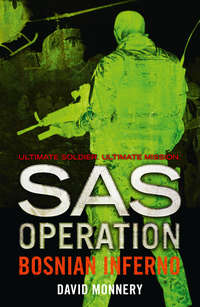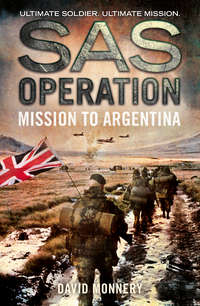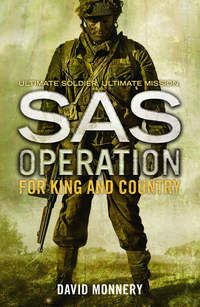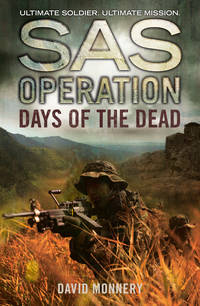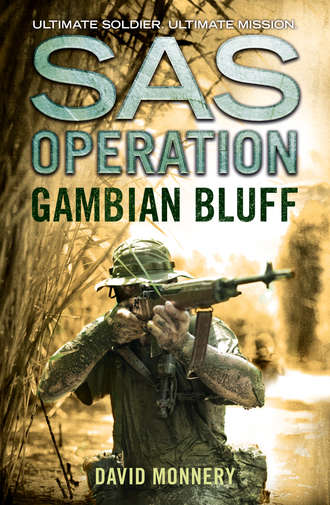
Полная версия
Gambian Bluff

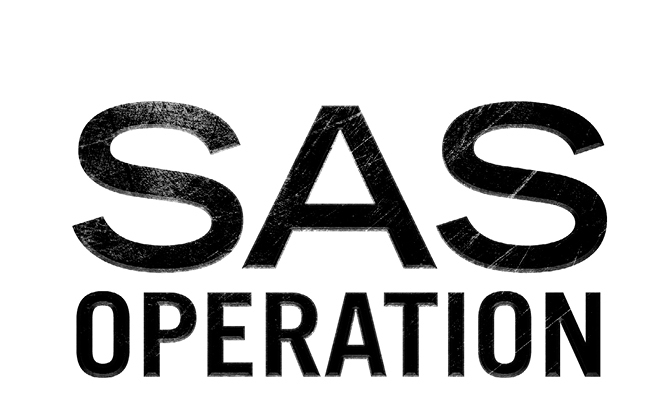
Gambian Bluff
DAVID MONNERY

Published by HarperCollinsPublishers Ltd
1 London Bridge Street
London SE1 9GF
www.harpercollins.co.uk
First published in Great Britain by 22 Books/Bloomsbury Publishing plc 1994
Copyright © Bloomsbury Publishing plc 1994
Cover layout design © HarperCollinsPublishers 2016
Cover Photographs © MILpictures, Tom Weber/Getty Images (main image); Shutterstock.com (textures)]
David Monnery asserts the moral right to be identified as the author of this work.
A catalogue copy of this book is available from the British Library.
Though many of the events depicted in this novel actually took place in The Gambia in the summer of 1981, it should be considered entirely a work of fiction. The names, characters and incidents portrayed in it are the work of the author’s imagination. Any resemblance to actual persons, living or dead, events or localities is entirely coincidental.
All rights reserved under International and Pan-American Copyright Conventions. By payment of the required fees, you have been granted the non-exclusive, non-transferable right to access and read the text of this e-book on screen. No part of this text may be reproduced, transmitted, down-loaded, decompiled, reverse engineered, or stored in or introduced into any information storage and retrieval system, in any form or by any means, whether electronic or mechanical, now known or hereinafter invented, without the express written permission of HarperCollins.
Source ISBN: 9780008155186
Ebook Edition © December 2015 ISBN: 9780008155193
Version: 2015-11-02
Contents
Cover
Title Page
Copyright
Chapter 1
Chapter 2
Chapter 3
Chapter 4
Chapter 5
Chapter 6
Chapter 7
Chapter 8
Chapter 9
Chapter 10
Chapter 11
Chapter 12
Chapter 13
Chapter 14
Epilogue
OTHER TITLES IN THE SAS OPERATION SERIES
About the Publisher
1
‘This town is ’coming like a ghost town…’
The song seemed to float ominously out of every open door and window as Worrell Franklin walked slowly down Acre Lane.
‘Do you remember the good old days before the ghost town?’
No, not really, he thought, although only a fool would deny that things were getting worse.
A Rasta walked past him, going up the hill, and the look he flashed Franklin was for his uniform, not his face. Or, to be precise, the combination of the two. The oppressor’s uniform, the face of the oppressed. A black soldier in a white man’s army.
Franklin was used to looks like that, and to the more subtle ones that blended hostility with respect, contempt with envy. He was someone who had got out, escaped. He was someone with a job, which these days felt more and more like a privilege in itself.
Normally he did not wear his uniform around Brixton – it was just easier not to – but this morning he had it on for a reason. The only reason around here. For impressing Whitey.
He turned left onto the High Road and walked north. A crowd of youths were outside the tube station, doing nothing, just waiting for something to ignite their interest. On his side of the road a crowd were gathered round a TV shop, watching the Royal Wedding on the dozen or so sets in the window. When Franklin had left his mum in their living room Lady Diana had been setting out from Clarence House in the ceremonial Glass Coach, looking like an upmarket Cinderella. Now she was walking up the steps of St Paul’s, trailing an ivory-coloured dress which looked long enough to play cricket on.
The camera followed her into the cathedral, dwelling on a few famous faces in passing: Mrs T in a blue pillbox hat, Nancy Reagan in a nauseating pink, the Queen in aquamarine, looking like she usually did, as if she was trying hard not to notice that someone had farted nearby.
And then there was the King of Tonga, whose specially reinforced chair had been featured on the news that morning. It would hardly do to have the great fat git crashing through his pew in the middle of the ceremony.
Franklin tore himself away from the glorious nuptials and walked on under the railway bridges. The police station was another two hundred yards down on the right, across from the junction with Stockwell Road. Even from a distance it looked like a fortress, with its windows protected by wire mesh, and the building itself by iron railings.
He wove his way through the stopped traffic at the lights and walked in through the front door. The desk sergeant’s face went through that series of expressions which Franklin could have painted from memory. First there was the instinctive mixture of contempt and hostility accorded any black face, second the unpleasant element of surprise which went with putting that face above the authority of a uniform. Then the observer’s brain engaged, realized that it was a British Army uniform, and spread relief back through the limbs. Finally the question of a reason for his presence intruded, creating a wariness which was usually expressed through mock aggression.
It all took about five seconds.
‘What can we do for you, John?’ the sergeant asked. Behind him, from somewhere deep within the recesses of the station, the sounds of the Royal Wedding could be heard. Another two policemen were watching the exchange, both of them white. Where are the black policemen? Franklin wondered. Probably ‘out in the community’, trying to explain themselves.
This was why he had joined up, to get away from all this.
‘My name is Worrell Franklin,’ he said formally. ‘I believe my brother Everton Franklin is in custody here.’
The desk sergeant’s face went through another sequence, culminating in brisk correctness. He opened one of the ledgers in front of him and ran his finger down a list. ‘That is correct, sir,’ he said. ‘He was remanded by the magistrates this morning.’
‘I’d like to talk to someone about the circumstances of the arrest, and to see my brother if that’s possible.’
‘I don’t know…’
‘I only have a twenty-four-hour leave,’ Franklin lied, ‘so I would appreciate it if something could be arranged.’ He wondered if anyone had recognized the winged-dagger badge, or whether he would have to spell out his membership of the SAS.
The desk sergeant glanced round at his two comrades, who stared blankly back at him. ‘I’ll see what I can do,’ he said, adding ‘have a seat, sir’ as he disappeared through a door. The other two resumed their paperwork.
Franklin sat down on the long bench and picked up the copy of the Sun which someone had left behind. Opposite the tits on page three he read that the identity of the Toxteth hit-and-run policeman had still not been established. Surprise, surprise, he thought. And the constable who had been brained by the TV thrown from the high-rise walkway was still in critical condition. There were victims wherever you looked.
Too much fighting on the dance floor…The bloody song would not leave him alone.
The sergeant returned with a plain-clothes officer, who introduced himself as Detective-Sergeant Wilson. ‘Like in Dad’s Army,’ he explained, most likely out of habit. ‘Not often we see the SAS in Brixton,’ he said. ‘We could have used you a few times this year,’ he added with a smile.
Someone had recognized the beret badge, then. Franklin politely returned the smile. ‘Can you tell me the circumstances of my brother’s arrest?’ he asked.
‘I can.’ He opened the file he was carrying, and extracted a typed sheet. ‘I’m afraid he’s facing four charges – possession of an offensive weapon, assault, damaging a police vehicle and using threatening behaviour. This is the arresting officer’s report,’ he said, handing it across.
It was not exactly a literary masterpiece. Nor did it seem particularly precise where it needed to be. The gist of it was that two officers had been inside one of the small businesses in Spenser Road when someone had thought fit to roll a petrol bomb under their car. Several arrests had followed, including that of Everton Franklin. He had apparently put up rather more than token resistance, setting about a policeman with a cricket bat.
‘There’s nothing here to connect my brother with the torching of the vehicle,’ Franklin murmured. Indeed there was nothing to suggest why the police had tried to arrest him in the first place.
‘He was probably carrying the bat,’ Wilson said, when confronted with this apparent oversight. ‘More evidence must have been offered to the magistrates, or they wouldn’t have remanded him.’
It didn’t seem the time or place to push the issue. ‘Can I see my brother?’ he asked.
‘If you wish, sir.’ The detective waited for a reply, as if hoping for a change of mind.
‘Yes, I would like to,’ Franklin said patiently. He was depressingly aware that if he had not been wearing his uniform his chances of getting even this far would have been less than zero.
‘Then come this way, sir.’
He was led down two corridors and ushered into what looked like an interview room. There was just a single table, with one chair either side of it, and two more against a wall. The two windows to the outside world were high enough to reveal only sky, the one in the door was small enough to remind Franklin of depressing prison films.
‘It’ll be a few minutes, sir,’ Wilson said, and disappeared, closing the door behind him. Franklin could hear the TV coverage of the Royal Wedding through the ceiling.
The minutes stretched out. How long could it take to bring someone up from the cells? Franklin had a sudden sinking sensation in his stomach – what if Everton was one of the unlucky few who went into a police station and never came out again? It did not happen often, but it did happen. It would kill their mum. Except that she would kill him first. He had always been expected to look out for his younger brother, and he had, at least until he had left home for the Army. He could scarcely watch over him from Germany or Northern Ireland. Or even from Hereford. And Everton was nineteen now. He should be able to look after himself.
But try telling his mum that.
He was about to go looking for Wilson when the door opened to reveal Everton. ‘Fifteen minutes, sir,’ Wilson said from behind him, before closing the door on the two brothers.
‘What you doin’ here?’ Everton asked wearily, sitting down at the table.
‘It’s good to see you, too,’ Franklin said, holding up a palm in greeting.
Everton gave it a half-hearted slap with his own. His face, Franklin noticed, bore a couple of angry-looking bruises. ‘How d’ya get those?’ he asked.
‘How d’ya think? I assaulted a policeman’s boot with my head.’
Franklin said nothing.
‘Don’t you worry ’bout me, bro,’ Everton said, more to break the silence than for any other reason. ‘There’s some Rastas here who pulled their own dreadlocks out to scourge the poor policemen with. By the roots,’ he added.
‘I read your arrest sheet,’ Franklin said.
‘Yeah? I bet that was a fine piece of fiction. They probably write poetry in their spare time, like that dickhead detective on telly.’
‘What did happen?’
‘You have to ask?’
‘Yeah, I have to ask. If the police report is a fine piece of fiction then I need someone else to tell me some fine fact, right?’
Everton breathed out noisily. ‘OK. I got no call to take it out on you.’ He sighed. ‘What happened was what always happens. Someone gives the police reason to freak, and they freak. Arrest anyone they can who’s the right colour, fill up the cells, then retire to their easy chairs upstairs to square their stories…’
‘What happened? Did a police car get petrol-bombed?’
Everton smiled. ‘Yeah. It was a couple of dumb kids. They’s probably halfway to Jamaica by now. They just roll this Coke can full of petrol with a bit of rag in it under the car. There’s no one inside it – the cops are inside Dr Dread’s, looking for some reason to bust him again. And the bomb goes off, but only like a firework – the car don’t go up or nothing. I was right there, talking to Benjy, when it all happens, and we see these kids in the garden next door playing cricket so we run in and try and get ’em to move in case there’s an explosion, right, but they ignore us, so we have to steal their bat. They come running after us, and the next thing I know about five policemen are jumping on top of me and throwing me in the back of a van. And they bring me here. And they make up a nice story for the magistrates, who all look at me like I should be grateful for not having been shot already.’ He looked at his brother. ‘That’s the whole story,’ he said.
‘And they beat you up?’
‘Not really. Just a couple of playful punches in the van. It was nothing much. I was lucky. Like I say, some of the Rastas really got treated bad.’
Franklin looked at the floor. Somewhere deep inside him, in that place he had learned to shut it away, his anger was straining for release. He suppressed the urge – where could it take him that he had not already been? He asked if Benjy had also been arrested.
‘No. He must have picked the right road to run down. Or maybe he just not carrying a cricket bat…’
‘So he can be a witness. Where’s he live?’
‘He won’t want to make himself that conspicuous. He knows what happens if he does.’
‘What happens?’
‘You’ve been away too long, bro. His car gets stopped every time he goes out, his social security gets delayed, the sniffer dogs take a liking to his house…you know.’
‘I’ll talk to him anyway. And there must have been other witnesses.’
‘Hundreds. And they all know they’re on a hiding to nothing. Even if they speak out the judges take the word of the policeman. So why speak out?’
Franklin had no answer. ‘You still looking for a job?’ he asked Everton.
‘Me and the rest of Brixton.’
‘I’ll get you out of here,’ Franklin said.
‘Oh yeah? Then I’ll keep my eyes on the windows for when the big black man comes abseiling in.’
Franklin refused to be provoked. ‘I’ll talk to some people,’ he said.
‘Worrell,’ his brother said, ‘one thing I like to know. The next time Brixton goes up, and they need the Army to put out the fire, whose side you be on?’
‘I go where my conscience say I should go,’ Franklin said. ‘I not on anyone’s side,’ he added, noticing that it only needed a few minutes with Everton and the old anger to have him talking like a Rasta again.
‘Then I hope your conscience is in good shape, man,’ Everton said, ‘cos I think you’re gonna need it to be.’
‘Yeah. You worry about your own future,’ Franklin said, getting up. ‘And don’t go assaulting no more policeman’s boots with your head.’
‘I’ll try real hard to restrain myself.’
‘Any message for Mum?’
‘Tell her I’m OK. Not to worry.’
‘OK. I’ll be back.’
As if on cue, Detective-Sergeant Wilson opened the door.
‘We’re done,’ Franklin said. He had already decided to make no complaint about the beating his brother had been given. It would serve no purpose, and it might conceivably get in the way of getting Everton released. ‘I appreciate your help,’ he told Wilson, catching a glimpse of his brother’s disapproving face over the detective’s shoulder.
Out on Brixton Road once more, he took a deep breath of fresh air and walked slowly back in the direction he had come. The crowd was still clustered around the bank of televisions, watching the now-married twosome leaving St Paul’s. They looked happy enough, Franklin thought, but who could really tell? He wondered if they had made love yet, or if the royal dick was yet to be unveiled. Maybe the Queen Mother would cut a ribbon or something.
He remembered his own mother had asked him to pick up some chicken wings in the market. Her younger son might be in custody, but the older one still had to be fed. Franklin recrossed the road and walked down Electric Avenue to their usual butcher. A street party seemed to be getting under way, apparently in celebration of the royal event. Prince Charles was the most popular establishment figure in Brixton – in fact, he was the only popular establishment figure. People thought he cared, which in the summer of ’81 was enough to make anyone look like a revolutionary.
The only big difference between this and a thousand other British neighbourhoods was the colour scheme – the flags and balloons were all red, yellow and green rather than red, white and blue. Even the kids milling on the street corners seemed to have smiles on their faces this morning, Franklin noticed. For a couple of hours it was just possible to believe there was only one Britain.
Unless, of course, you were locked up in one of the Brixton Police Station’s remand cells for no better reason than being the wrong colour in the wrong place at the wrong time.
2
One of the many heads of state attending the Royal Wedding was Sir Dawda Jawara, President of the small West African state of The Gambia. In the colonial twilight of the early 1960s Jawara had led his nascent country’s pro-independence movement, and ever since that heady, flag-exchanging day in 1965 he had presided over the government of the independent state. The Gambia was not exactly a huge pond – its population had only recently passed the half-million mark and its earnings were mostly derived from groundnuts and tourism – but there was no doubting who was the biggest fish.
The Wedding over, the embassy limousine swished President Jawara out of London and south down the M23 towards Haywards Heath, where he planned to spend a long weekend with an old college friend. With him he had one of his younger wives; the senior wife, Lady Chilel Jawara, had stayed at home to preside over the household and the well-being of his eight children.
That evening he watched reruns of the Wedding, and talked with his host about the next day’s test match. It had always been one of Jawara’s great disappointments that his country, unlike, say, Guyana, had not taken the Empire’s game to its collective heart. The occasional unofficial test matches against Sierra Leone in the early 1960s had by now almost faded from the national memory.
Lately, though, there had been more serious causes for Gambian concern. The previous November a Libyan-backed coup had been foiled only with Senegalese help, and in the meantime the poor performance of the economy had led to food shortages, particularly in the volatile townships in and around the capital. That evening, sitting in his friend’s living room, a pleasant night breeze wafting through the open French windows, Jawara might have felt momentarily at peace with the world, but not so his countrymen.
As Newsnight drew to a close in the Sussex living room, two lorry-loads of armed men were drawing up in front of The Gambia’s only airport, at Yundum, some ten miles as the crow flies to the south-west of the capital, Banjul. The forty or so men, some in plain clothes, some in the uniform of the country’s paramilitary Field Force – The Gambia had no Army as such – jumped down from the lorries and headed off in a variety of directions, in clear accordance with a previously decided plan. Those few members of the Field Force actually on duty at the airport had received no advance warning of any exercise, and were at first surprised and then alarmed, but the appearance of Colonel Junaidi Taal, the 500-strong Field Force’s second in command, was enough to set their minds at rest, at least for the moment. Clearly this was official business.
Taal did not stop to explain matters. As his men fanned out to occupy all the relevant aircraft, offices and communication points, he headed straight through the departure area and into the office of the airport controller.
The last plane of the day – the 21.30 flight to Dakar – had long since departed, but the controller was still in his office, catching up on paperwork. As his door burst open he looked up in surprise. ‘What is this…’ he started to say in Mandinka, his voice trailing away at the sight of the guns in the hands of the civilians flanking the Field Force officer.
‘There has been a change of government,’ Taal said bluntly in English.
The controller’s mouth opened and closed, like a fish’s.
‘The airport will remain closed until you hear to the contrary,’ Taal said. ‘No planes will take off, and no planes will land. The runway is being blocked. You will inform all the necessary authorities that this is the case. Understood?’
The controller nodded vigorously. ‘Yes, of course,’ he said, wondering, but not daring to ask, how much more of the country these people – whoever they were – had under their control. ‘What reason should I give the international authorities for the closure of the airport?’
‘You don’t need to give a reason. They will know soon enough.’ He turned to one of the two men in civilian clothes. ‘Bunja, you are in command here. I’ll call you from the radio station.’
Banjul lies on the south-western side of the River Gambia’s mouth and is separated from the rest of the southern half of the country – the major tourist beaches of Bakau and Fajara, the large township of Serekunda and the airport at Yundum – by a large area of mangrove swamp, which is itself intersected by numerous small watercourses and the much larger Oyster Creek. Anyone leaving or entering Banjul had to cross the creek by the Denton Bridge, a two-lane concrete structure two hundred yards long. At around two a.m. Taal and twenty rebels arrived to secure the bridge, left half a dozen of their number to set up checkpoints at either end, and roared on into Banjul.
The lorry drew up outside the darkened building in Buckle Street which was home to Radio Gambia. No one answered the thunderous knock on the door, so two Field Force men broke it down, and the rebels surged into the building. They found only three people inside, one man in the small studio, sorting through records for the next day’s playlist, and one of the engineers undressed and halfway to paradise with his equally naked girlfriend on the roof. The engineer was bustled downstairs, while the two remaining rebels handed his girlfriend her clothing bit by bit, snickering with pleasure at her embarrassment, and fighting the urge to succumb to their own lust. It was fortunate for the girl that the coup leaders had stressed the need for self-discipline – and the punishments reserved for those who fell short of this – to all of their men. The girl, tears streaming down her face, was eventually escorted downstairs, and left sitting in a room full of records.
The radio station now secure, Taal called Bunja at the airport and checked that nothing had gone amiss. Nothing had. Further calls confirmed that the Banjul ferry terminal and the main crossroads in Serekunda had been seized. Taal called the main Field Force depot in Bakau where the coup leader, Mamadou Jabang, was waiting for news.
‘Yes?’ Jabang asked, his voice almost humming with tension. ‘Everything has gone according to plan?’



